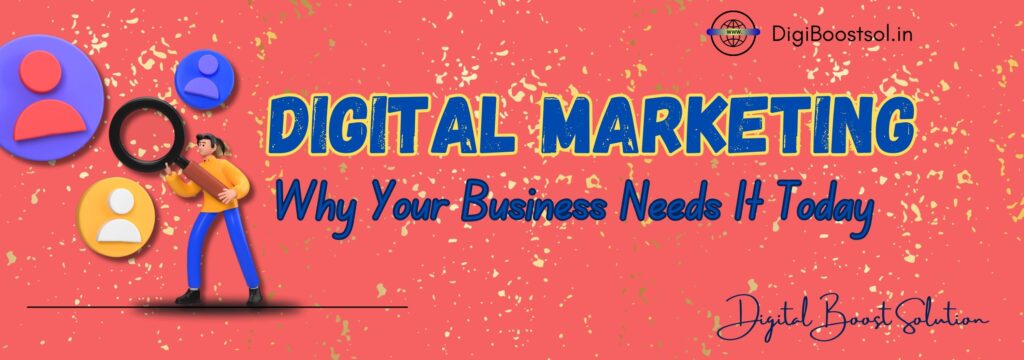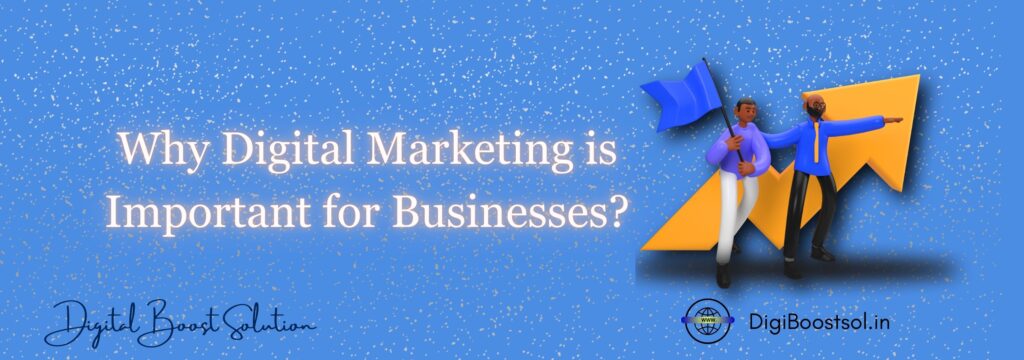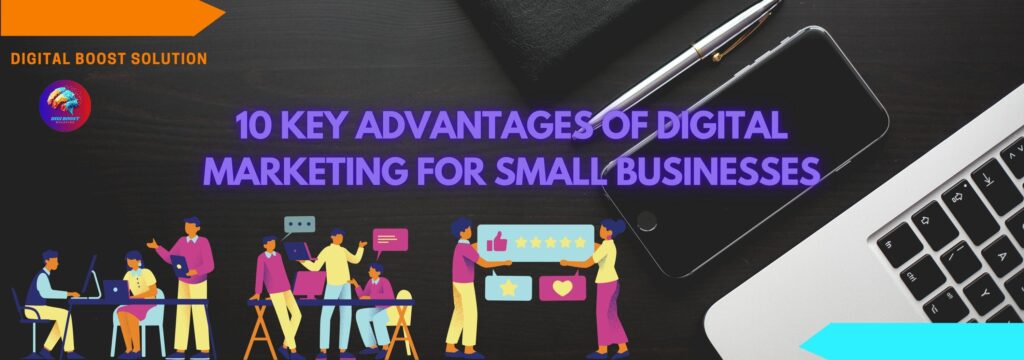
In today’s fast-paced digital world, the way businesses promote their products and services has drastically evolved. Traditional marketing methods are slowly becoming outdated, and Digital Marketing is taking center stage. But what exactly is Digital Marketing and why is it so important for businesses of all sizes? This comprehensive guide will walk you through the concepts, strategies, benefits, and reasons why every business must adopt digital marketing in today’s competitive environment.
1. Understanding Digital Marketing
Definition of Digital Marketing:
Digital marketing refers to the use of digital channels, platforms, & technologies to promote or market products and services to consumers and businesses. It includes a broad range of marketing activities that are executed through digital devices such as computers, mobile phones, tablets, and other digital mediums.
Types of Digital Marketing
There are several types of digital marketing strategies that businesses use to reach their target audiences:
- Search Engine Optimization (SEO)
- Improving website visibility in search engine results.
- Driving organic (non-paid) traffic.
- Content Marketing
- Creating and distributing valuable, relevant content to attract and engage an audience.
- Examples: Blogs, articles, videos, infographics, and eBooks.
- Social Media Marketing
- Promoting products and engaging with audiences on platforms like Facebook, Instagram, LinkedIn, Twitter, etc.
- Promoting products and engaging with audiences on platforms like Facebook, Instagram, LinkedIn, Twitter, etc.
- Email Marketing
- Sending targeted emails to prospects and customers to build relationships and promote offerings.
- Sending targeted emails to prospects and customers to build relationships and promote offerings.
- Pay-Per-Click (PPC) Advertising
- Paid online advertisements (e.g., Google Ads, Facebook Ads) that drive traffic and generate leads.
- Paid online advertisements (e.g., Google Ads, Facebook Ads) that drive traffic and generate leads.
- Affiliate Marketing
- Partnering with affiliates who promote your products and earn a commission on sales.
- Partnering with affiliates who promote your products and earn a commission on sales.
- Influencer Marketing
- Collaborating with influencers to promote your brand to their audience.
- Collaborating with influencers to promote your brand to their audience.
- Mobile Marketing
- Marketing on smartphones through apps, SMS, push notifications, etc.
- Marketing on smartphones through apps, SMS, push notifications, etc.
- Video Marketing
- Promoting products through video content on platforms like YouTube, Instagram, etc.
- Promoting products through video content on platforms like YouTube, Instagram, etc.
2. The Evolution of Marketing
From Traditional to Digital
Traditional marketing methods such as newspapers, radio, television, and billboards are still relevant but have limitations. They are expensive, hard to measure, and lack direct interaction with consumers.
Digital marketing, on the other hand, is cost-effective, measurable, and allows real-time interaction with target audiences.
Consumer Behavior Shift
- More than 5 billion people use the internet globally.
- Most consumers now search online before making a purchase.
- Social media platforms influence buying decisions.
- Mobile usage has overtaken desktop usage.
These trends have made digital marketing a necessity rather than an option.
3. Why Digital Marketing is Important for Businesses

1. Global Reach
Digital marketing enables businesses to reach a global audience without geographical limitations. A small business in India can now serve customers in the USA, UK, or Australia with the right digital strategy.
2. Cost-Effective Marketing
Compared to traditional methods, digital marketing is more affordable. Small businesses can start with minimal investment and scale up based on results.
3. Measurable Results
Tools like Google Analytics, Facebook Insights, and email marketing platforms provide real-time performance data. This helps businesses analyze ROI, customer behavior, and campaign effectiveness.
4. Better Targeting
Digital marketing allows precise targeting based on demographics, interests, behaviors, location, etc., ensuring that marketing efforts reach the right audience.
5. Improved Customer Engagement
Social media and other interactive platforms enable two-way communication, helping businesses build relationships and trust with their audience.
6. Increased Conversion Rates
With proper targeting and engagement, digital marketing often leads to higher conversion rates compared to traditional marketing.
7. Builds Brand Reputation
Consistent online presence through content, reviews, social media, and SEO helps build a strong and trustworthy brand image.
8. Enhanced Customer Experience
Digital channels allow businesses to offer better customer service, support, and personalized experiences, which increase customer satisfaction and loyalty.
4. Key Components of a Successful Digital Marketing Strategy
1. Website Optimization
- Fast loading time
- Mobile-friendly design
- Clear navigation
- Call-to-actions (CTAs)
2. Search Engine Optimization (SEO)
- On-page SEO (keywords, meta tags, content)
- Off-page SEO (backlinks, social sharing)
- Technical SEO (site structure, speed, indexing)
3. Content Creation
- Blogging
- Video content
- Infographics
- Case studies
- Whitepapers
4. Social Media Presence
- Consistent posting schedule
- Engagement with followers
- Paid ad campaigns
5. Email Campaigns
- Personalized and automated messages
- Customer segmentation
- Lead nurturing
6. Paid Advertising
- PPC campaigns
- Retargeting ads
- Influencer collaboration
7. Analytics and Monitoring
- Track KPIs (Key Performance Indicators)
- Use data to improve campaigns.
- A/B testing
5. Digital Marketing for Different Types of Businesses
1. Small Businesses
- Cost-effective promotion
- Local SEO helps attract nearby customers.
- Social media creates brand awareness.
2. Startups
- Fast market entry
- Measurable marketing strategies
- Content marketing helps establish thought leadership.
3. E-commerce Stores
- Product listing ads
- Social media promotions
- Email marketing for cart recovery
4. Service Providers
- Build authority with blogs and videos.
- Lead generation through landing pages
- Customer testimonials and reviews
5. B2B Companies
- LinkedIn marketing
- Whitepapers and case studies
- Lead nurturing through email automation.
6. Future of Digital Marketing
1. Artificial Intelligence (AI)
AI is transforming digital marketing by enabling automation, chatbots, personalized marketing, and data analysis.
2. Voice Search
With the rise of smart speakers, optimizing for voice search is becoming essential.
3. Video Content Dominance
Short-form videos, live streams, and reels are gaining popularity for brand engagement.
4. Augmented Reality (AR) and Virtual Reality (VR)
AR/VR is creating immersive customer experiences, especially in e-commerce and real estate.
5. Influencer and Community Marketing
Building communities and leveraging micro-influencers will play a key role in brand development.
7. Common Digital Marketing Tools
- Google Analytics
- SEMrush
- Ahrefs
- Canva
- Mailchimp
- Hootsuite
- HubSpot
- Meta Business Suite
- Google Ads
- Ubersuggest
8. Challenges in Digital Marketing
- Rapid algorithm changes
- High competition
- Ad fatigue
- Privacy concerns (GDPR, data protection laws)
- Consistent content creation
However, with the right strategy and team, these challenges can be managed effectively.
9. How to Get Started with Digital Marketing
Step 1: Define Your Goals
What do you want to achieve? (Brand awareness, leads, sales, etc.)
Step 2: Identify Your Target Audience
Who are your customers? What are their interests and pain points?
Step 3: Choose the Right Channels
Select platforms where your audience spends time.
Step 4: Create High-Quality Content
Focus on delivering value, not just promotions.
Step 5: Monitor and Improve
Use analytics to evaluate performance and optimize strategies regularly.
Conclusion
Digital marketing is no longer a luxury — it’s a necessity for businesses in the 21st century. Whether you’re a startup, an established enterprise, or a small local business, digital marketing provides endless opportunities to grow your brand, connect with customers, and drive revenue.
By embracing the right strategies, staying updated with trends, and focusing on customer needs, businesses can thrive in the digital era. The future belongs to those who adapt and innovate — and digital marketing is your gateway to that future.
Learn More:



hello your content is very help full for me.
Pingback: Keyword Research: Definition, Importance, and How to Do It - Digital Boost Solution